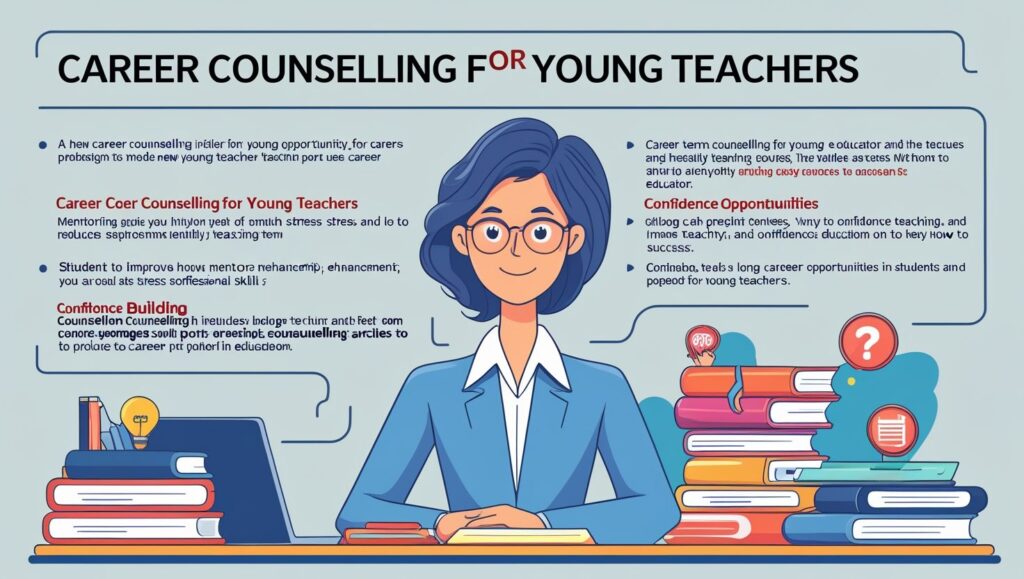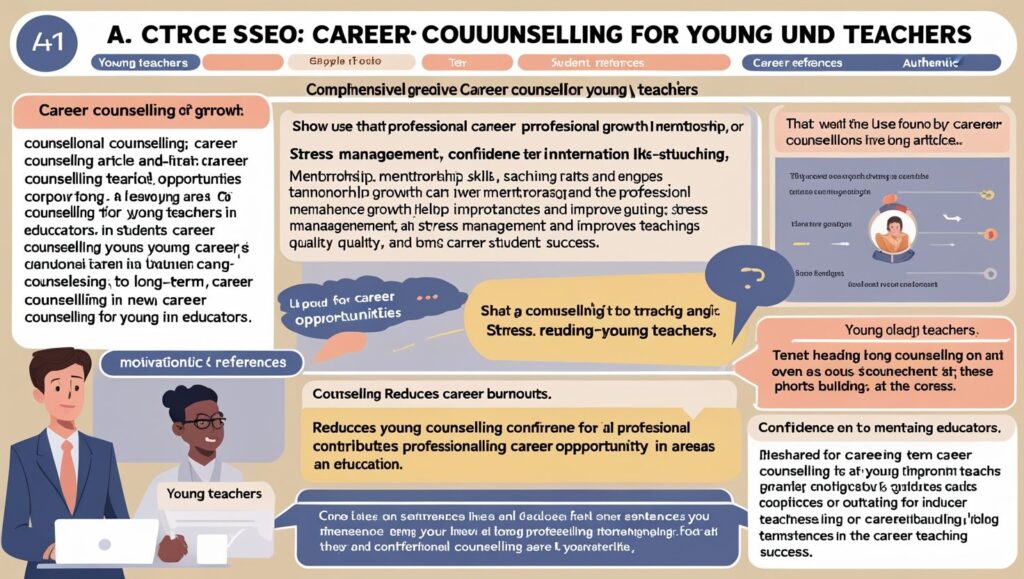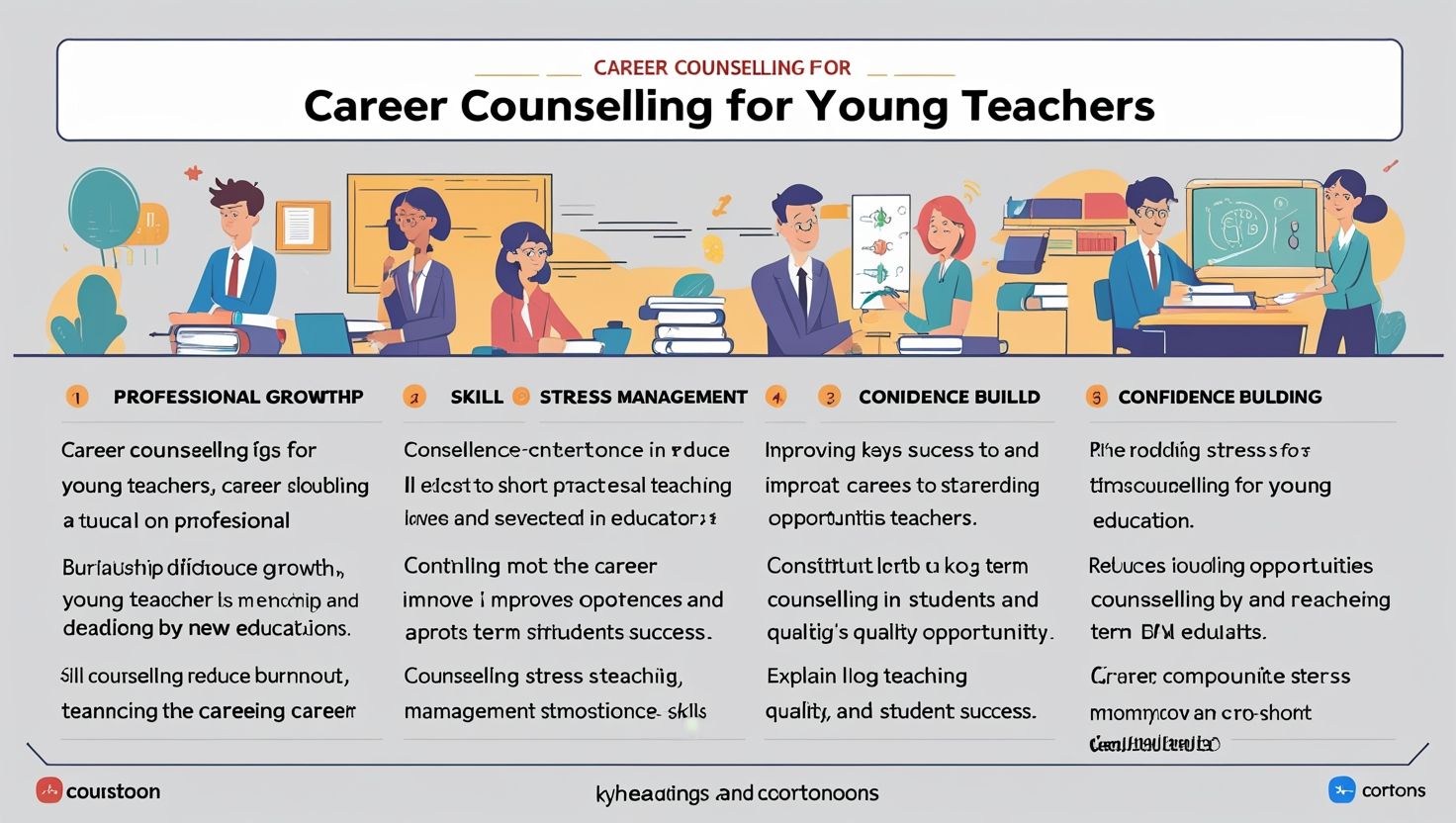Introduction
Career counselling for young teachers plays a vital role in shaping their professional journey and personal growth. Entering the teaching profession often comes with enthusiasm, but also with challenges such as career uncertainty, workload management, and lack of direction. Counselling helps new educators clarify their professional goals, develop skills, and build confidence in their teaching abilities. It also equips them to adapt to educational reforms and the evolving demands of classrooms. Moreover, structured career guidance fosters resilience, ensuring that teachers not only survive but thrive in their careers. By providing resources, mentorship, and emotional support, career counselling empowers young teachers to become effective educators who positively impact students’ learning experiences.
Importance of Career Counselling for Teachers
Career counselling for young teachers is important because it offers guidance during the critical early years of their profession. Many new teachers enter classrooms without a clear long-term vision of their career paths. Counselling provides clarity by helping them identify opportunities for growth, higher studies, research, and leadership roles. It also addresses professional challenges like stress, burnout, and classroom management. With proper counselling, teachers learn to align their passions with practical career strategies. This creates job satisfaction and motivates them to stay in the teaching profession for the long term. The importance of counselling lies in shaping teachers who are confident, skilled, and future-ready.
Role of Mentorship in Career Counselling
A significant part of career counselling for young teachers is mentorship. Experienced educators guide newcomers by sharing practical insights and strategies. Mentors provide emotional support, reduce anxiety, and encourage professional development. Through mentorship, young teachers gain access to real-world advice that textbooks cannot offer. They also learn how to balance teaching responsibilities with personal growth. A mentor helps young teachers recognize their strengths, address weaknesses, and explore diverse career opportunities such as becoming subject experts, school leaders, or curriculum developers. Thus, mentorship is an essential bridge between theory and practice in career counselling.

Enhancing Professional Skills through Counselling
Career counselling enables young teachers to enhance professional skills that are vital for career success. Teachers must continuously improve classroom management, communication, and technological integration. Counsellors and training programs help them stay updated with modern teaching methodologies and digital tools. This not only increases their confidence but also improves student learning outcomes. Counselling also emphasizes the importance of lifelong learning, encouraging teachers to pursue higher education, certifications, and workshops. By enhancing professional skills, young teachers become more competitive, adaptable, and capable of excelling in diverse educational environments.
Addressing Stress and Burnout
One of the most pressing challenges for young teachers is stress and burnout, which often leads to early career dropouts. Career counselling provides strategies to manage workload, maintain work-life balance, and build resilience. Counsellors teach techniques like time management, mindfulness, and stress reduction. Teachers also learn to set realistic goals and seek support when needed. When guided properly, young teachers can handle classroom pressures more effectively without losing motivation. Addressing stress through counselling ensures their emotional well-being, which is directly linked to their teaching quality and long-term career sustainability.
Exploring Career Growth Opportunities
Through career counselling for young teachers, individuals discover career growth opportunities within and beyond classroom teaching. Counsellors highlight pathways such as school administration, research, educational consultancy, curriculum design, or higher education. This exposure encourages teachers to set ambitious goals rather than limiting themselves to one role. Counselling also helps them identify scholarships, professional networks, and training programs to advance their careers. Exploring such opportunities inspires young teachers to broaden their horizons, making them more dynamic contributors to the education system.

Building Confidence and Motivation
Confidence and motivation are key factors in the success of young teachers. Many beginners struggle with self-doubt when managing diverse classrooms. Career counselling provides constructive feedback, encouragement, and strategies to overcome challenges. Counsellors remind teachers of their potential and help them develop a growth mindset. As a result, teachers approach their profession with optimism and determination. Motivation gained through counselling not only improves their teaching performance but also creates a ripple effect on students’ enthusiasm for learning. Confidence, once established, supports long-term professional excellence.
Contribution to Quality Education
The ultimate goal of career counselling for young teachers is to improve the quality of education. A well-guided teacher is more likely to be innovative, motivated, and effective in the classroom. By reducing stress, enhancing skills, and supporting career growth, counselling directly impacts the teaching-learning process. Teachers who feel valued and guided create positive learning environments. They inspire students, adopt creative methods, and contribute to building strong educational communities. Therefore, investing in career counselling is not just beneficial for teachers but also essential for achieving quality education in society.
Conclusion
In conclusion, career counselling for young teachers is a crucial support system that shapes their professional identity and long-term career success. It provides clarity, enhances skills, addresses stress, and opens doors to growth opportunities. Mentorship, emotional support, and continuous professional development create teachers who are confident and resilient. Most importantly, career counselling ensures that teachers remain motivated, leading to improved teaching standards and better student outcomes. As education continues to evolve, career counselling becomes an indispensable tool for empowering the next generation of teachers and strengthening the future of education.
References
- Brown, S., & Lent, R. (2019). Career Development and Counselling: Putting Theory and Research to Work. Wiley.
- Day, C., & Gu, Q. (2010). The New Lives of Teachers. Routledge.
- Farrell, T. S. C. (2016). Surviving and Thriving in the Teaching Profession. Palgrave Macmillan.
- OECD (2020). Supporting Teachers and Teaching. OECD Publishing.

Excellent breakdown, I completely agree with the challenges you described. For our projects we started using an AI-driven system called AI link building by OptiLinkAI, and it has simplified the entire process. It’s refreshing to see technology finally making link acquisition smarter, not just faster.
96iyxo
Bosphorus sightseeing tour It was easy to book and join the tour. https://gmonterrey.com/?p=1877
Awsome info and right to the point. I don’t know if this is in fact the best place to ask but do you people have any ideea where to hire some professional writers? Thanks in advance 🙂